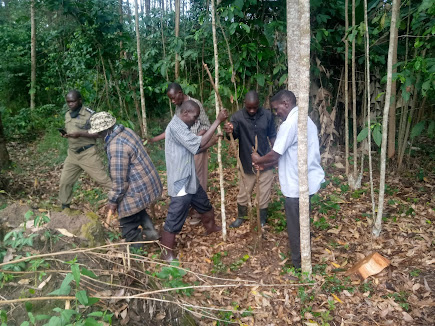Community sensitization meetings towards Restoration of Kasaana- Nabyewanga wetland ecosystem in Lwengo District
Kasaana- Nabyewanga wetland
is in Lwengo District of South-Central Uganda. The wetland is share by two
villages of Kasaana and Nabyewanga and hence the adopted name to the wetland.
There are ecosystem resources obtained from this wetland such as clean water, medicine,
building materials, and others are therefore shared by both the two villages.
The wetland is critically important as feeding and sometimes a breeding ground
for the endangered Grey Crowned cranes, a bird listed endangered
on the IUCN red list of species.
Under the African Crane
Conservation Program(ICF/EWT partnership projects), Our routine monitoring has revealed that several
pairs exist and sometimes a flock of 6 and above cranes is found in this part
of the wetland feeding on rice, insects, and others. However, this wetland is
highly threatened by agriculture encroachment where rice growing, maize, and
sugarcane growing are the major activities. This wetland is the only source of
water for the Households here but also, communities have reported a high level
of Human-Crane conflicts where many cranes have been reported to be poisoned
through pesticide application. Reports gathered from the communities we met
showed that some children were being employed secretly to always pick the dead
carcasses of cranes for disposing of.
we conducted an engagement meeting with the
two villages. The meeting aimed at;
- sensitizing the
communities about the importance of demarcating this wetland to reduce
further expansion into this precious wetland. Our discussion with the
local communities yielded and agreed to begin a demarcation exercise as
soon as February 2021 where local indigenous tree species especially Ficus
natalensis and Erythrina abyssinica were suggested.
- Forming the Kasaana-
Nabyewanga wetland Management Committee: With marginalized groups included
a total of 6 individuals (2 females and 4 males) in Kasaana village and 5
individuals (2 females and 3 males) in Nabyewanga village were initiated
as the committee to oversee the implementation of the demarcation boundaries
(once planted) and also to regulate the activities in this wetland


Comments
Post a Comment
feel free to comment